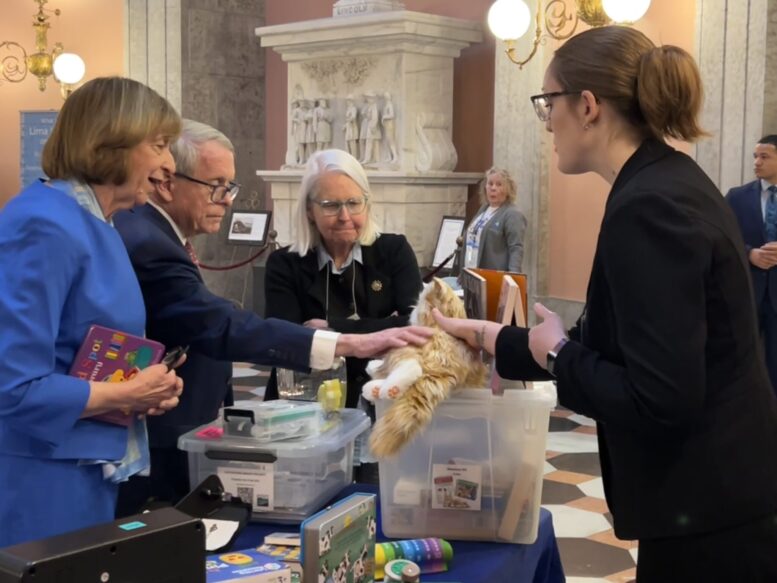BY SUSAN TEBBEN
Calls from the Ohio Library Day gathering of about 350 library staff members from across the state were possibly heard from the Ohio Statehouse atrium on Tuesday, because the newest House version of the budget walks back plans to eliminate the Public Library Fund.
If it wasn’t the advocacy gathering on Tuesday, it could have been the calls and emails legislators received amid the budget process, according to some that attended the event.
“I have never in my entire time in the Statehouse received more emails and phone calls from individuals … advocating for their libraries,” said House Minority Leader Allison Russo, D-Upper Arlington, to cheers from the crowd.
[RELATED: Library funds get boost in House version of state budget, but still fall short]
Republican House Speaker Pro Tempore Gayle Manning also said she’s “been receiving a lot of emails lately,” as has state Sen. Jerry Cirino, R-Kirtland.
“It is very clear what your interests are,” said Cirino, who will face budget negotiations head-on as the budget discussion heads for the Senate Finance Committee, of which he is the chair.
GET THE MORNING OCJ HEADLINES.SUBSCRIBE
Cirino made no guarantees about funding, partly because the House had not finished their discussions of the omnibus bill as of Tuesday morning when he spoke to the crowd.

“No guarantees, don’t know what it’s going to end up as,” Cirino said. “But trust me, you’ve got a lot of us that really believe in libraries and what you do and what you bring to the communities.”
A summary of the omnibus bill released on Tuesday afternoon states that the current distribution of state funds to public libraries was put back, instead of a proposed “population-based formula” initially written into the House budget draft. The omnibus bill is set to be put to a vote on Wednesday.
The new budget amendment appropriates $490 million in fiscal year 2026 for the Public Library Fund, and $500 million in fiscal year 2027.
The House budget proposal, even with the restoration of the PLF, comes in at a lower allocation than Gov. Mike DeWine proposed in his executive budget, which had an increase to the fund from 1.7% to 1.75% of tax revenue in the General Revenue Fund.
According to the Ohio Library Council, DeWine’s proposal would have allocated $531.7 million in 2026 and $549.1 million the year after.
DeWine praised libraries at Tuesday’s event, and said, of funding public libraries as it has been done for the last century, “I think that’s probably something that really should be continued.”
“Our libraries are really at the center of each community,” DeWine said. “It doesn’t matter whether it’s in an inner city, it doesn’t matter whether it’s in Harrison County or any of our smaller counties.”
Asked for tips on advocating as the budget moves on to the Senate, the governor said engaging directly with the senators in individual districts would make the most impact, and give them the perspective of those in their communities.
“We all react to people and we react to stories,” he said. “Statistics are interesting, stories are people.”
Anne Rhodes and Allison Howell, of the Mansfield/Richland County Public Library, were more than happy to give DeWine and others the story of their library, which not only provides reading services, but also a “library of things” where residents can rent items such as power tools and board games. The library can help convert old VHS tapes and other old recording types for free, and brings their bookmobile to nursing homes and assisted living facilities.
Rhodes said a community member told her his mother gets books from the bookmobile monthly, looking forward to the delivery every time.
“He said it has just changed her world,” Rhodes said. “It gives her something to do and keeps her interested, and she’s excited to see what she gets every month.”
The “library of things” not only saves people the cost of buying a power tool or musical instrument that they may only need temporarily, but helps enrich lives without the burden of cost, Howell said.
“We have kids come in and they get so happy that they can get a board game that they can play with their parents because they may not be able to afford a board game,” she said.

Library patrons were panicked when they heard news that state funding might be at risk, according to Rhodes.
“When they started talking about these budget cuts, I don’t know how many phone calls we got in our office, pretty much immediately with people, their hair was on fire,” Rhodes said. “I’ve had people call in tears that they’re worried about the cuts.”
Russo, Manning, Cirino, and state Sen. Beth Liston, D-Dublin, all spent some of their time at the library advocacy event explaining how their local libraries benefitted them, from reading help when they were children, to helping their own children, and giving them space to hear from constituents on the issues of the day. Now, more than ever, legislators said libraries are in need of support.
“I think everyone will agree that in our changing times, there has been a huge need for places where people can come together and gather and feel part of things,” Liston said. “I would agree that it is critical that we maintain the funds for the library system through our public library funding.”
Cirino didn’t question the value of libraries, but as the budgeting process goes forward into his committee and the Senate, he said a big question will be: “How much can we afford to support it?”
“I think like everybody else that we appropriate, it should be a biennial appropriation process that’s justified based on input and feedback that we get, not an automatic number,” Cirino told media after he spoke to the library group. “… I think the way that the House presented it in their sub bill (with a population-based formula) … I think will actually be better off for libraries.”
Russo said changes to the Public Library Fund that would reduce the monies going to those entities, even more so than the $27 million public libraries lost over the last year, would bring the costs back to the residents. Without state funding, libraries are forced to ask for property tax levies to supplement the costs of business and performing what Russo said are “critical needs in our communities.”
“When we take money away from those efforts that are being done very well in our communities, that actually costs us money in the longterm,” Russo told the Capital Journal. “The reason that our communities have to keep going back to local residents is because we are not doing our share here at the Statehouse.”





